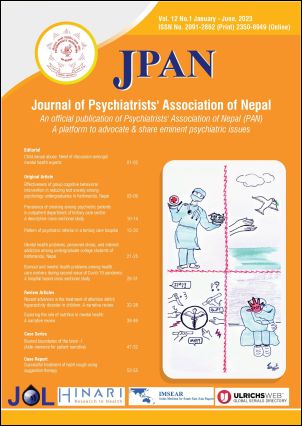Mental health problems, perceived stress, and internet addiction among undergraduate college students of Kathmandu, Nepal
DOI:
https://doi.org/10.3126/jpan.v12i1.59422Keywords:
Mental health screening questionnaire, Internet addiction, Stress, College students, NepalAbstract
Introduction: The global burden of disease due to mental health problems is on a rise. One of the vulnerable groups are college going youths. The objective of the current study was to examine the frequency and pattern of mental health problems, perceived stress, and internet addiction and explore their relationship with each other among students reporting voluntarily during stress management program.
Material and method: A cross-sectional study among 139 undergraduate students was conducted as a part of a program titled "Stress, drugs and internet among college students" during orientation program for undergraduate students of a management college in Kathmandu Valley. Mental Health Screening Questionnaire (MHS), Young's Internet addiction test (YIAT), perceived stress scale (PSS) were used for mental health problems, internet addiction and stress respectively.
Results: As per mental health screening questionnaire, 64.7% (90/139) and 7.2% (10/139) participants reported somewhat difficulty and very much or extreme difficulty. There was mild internet addiction among 45.3% and moderate internet addiction among 18.7%. There was significant positive correlation of the MHS score (indicative of number of mental health problems) with the total YIAT score (ρ= 0.404, p< 0.01) and PSS scores (ρ= 0.301, p< 0.01). Also, severity of internet addiction and perceived stress levels were positively associated with each other (ρ= 0.303, p< 0.01).
Conclusion: There is significant burden of mental health problems, stress and problematic internet use among the undergraduate students in Nepal. There is also a significant positive correlation of the MHS score (indicative of number of mental health problems) with the Young’s internet addiction test score and perceived stress scale scores.
Downloads
Downloads
Published
How to Cite
Issue
Section
License

This work is licensed under a Creative Commons Attribution 4.0 International License.
This license enables reusers to distribute, remix, adapt, and build upon the material in any medium or format, so long as attribution is given to the creator. The license allows for commercial use.




